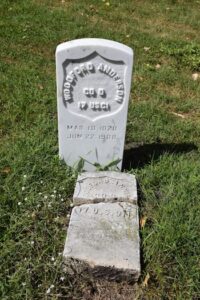
Woodford Anderson gravestone
*Woodford Anderson was born on this date in 1820. He was a Black soldier, cook, and laborer.
Woodford Anderson was born a slave in Burlington, Kentucky. When he was 20 years old, he was sold to George Curtley, a captain in the Confederate Army, who took Anderson to Waverly, Missouri, where Anderson was a cook. He was not a young man when he sought freedom. In the fall of 1862, during the American Civil War, when he was 42 years old, Anderson left Curtley and joined the Union Army.
In a deposition from his 60-page pension file, he said, "I was just following the Union Army as a contraband." In May of 1863, Anderson was sent to Fort Snelling in Minnesota. Although he had not formally enlisted at that point, he was on Sibley's expedition to the West, where he was a cook for the 1st Minnesota Mounted Rangers. On March 10, 1864, after he returned to Fort Snelling, he formally enlisted as a private in Company D of the U.S. Colored Troops. His unit was sent to Nashville.
On June 1, 1865, he was discharged for disability because he suffered from rheumatism and chronic diarrhea. Michael Brady, a fellow soldier, recalled seeing Anderson on the day that he received his discharge: "He had no coat or vest, but he had a paper in his hand and carried a cane. I asked him where he was going, and he said he had just been discharged and was heading to St. Paul. "The men had not been paid, so Anderson hoped to work his way North on a boat. The disabilities that ended his military service would continue to plague him for the rest of his life. By 1890, his health had deteriorated. He had heart trouble, difficulty breathing, and was losing his sight. He never sought medical treatment but, instead, treated himself with patent medicines and liniments. He qualified for a disability pension under the recently passed Dependents and Disabled Act.
Before the passage of that Act, veterans had to prove that their military service caused their disability. The new Act required only that a soldier had served for 90 days, had been honorably discharged, and was disabled, even if his disability was not war-related. Claims could still be denied if the disability was caused by "vicious habits." Horace Carlisle, a prominent member of Minneapolis' Black community and the brother-in-law of John Cheatham, Minneapolis' first Black firefighter, was one of those who testified on Anderson's behalf. The other was John Thomas. They both described Anderson as a man of good moral character. Still, getting his application approved was not an easy task.
He first had to establish that he was who he claimed to be. Even though he had never gone by any name other than Woodford Anderson, his military records are under Woodruff Annison. He was also variously referred to as Woodruff Anderson and Woodford Annison. Four variations for the same man. Initially, he was unaware of the problem with his military records, most likely because he was illiterate. As he put it, he always signed papers with his mark (an "X").
Once he learned about the problem, he sought to have it corrected. A special examiner was assigned to sort out the issues. He believed Anderson's claim, describing him as a man" having a good memory and [seeming] intelligent" whose "reputation for the truth was fair." He took depositions from two of Anderson's fellow soldiers, who swore that they had always known him as Woodford Anderson. One of those men was Amos Watkins, a Black Civil War veteran, who is also buried in the Cemetery. Watkins, like Anderson, was a barber and had employed him off and on over many years, even when Anderson was too sick to work.
Anderson's 1890 request for a pension was approved after a ten-month wait. He received $6.00 a month (about $208 in today's dollars). In 1897, as he became increasingly disabled, he requested an increase and was granted $8.00 a month. On December 31, 1907, Anderson's pension was increased to $12.00 a month. He died a little over six months later. Woodford Anderson died on June 19, 1908.